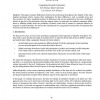Free Online Productivity Tools
i2Speak
i2Symbol
i2OCR
iTex2Img
iWeb2Print
iWeb2Shot
i2Type
iPdf2Split
iPdf2Merge
i2Bopomofo
i2Arabic
i2Style
i2Image
i2PDF
iLatex2Rtf
Sci2ools
MT
1998
1998
Translation Differences and Pragmatics-Based MT
: This paper examines differences between two professional translations into English of the same Spanish newspaper article. Among other explanations for these differences, such as outright errors and free variation, we find a significant number of differences that can be explained on the basis of differing beliefs on the part of the translators about the subject matter. In particular, we attribute translation differences to differing beliefs about the probability of future events and of rational or irrational behavior in response to such probability. We discuss the requirements for a pragmatics-based model of translation that would account for these differences.
Related Content
| Added | 22 Dec 2010 |
| Updated | 22 Dec 2010 |
| Type | Journal |
| Year | 1998 |
| Where | MT |
| Authors | Stephen Helmreich, David Farwell |
Comments (0)

